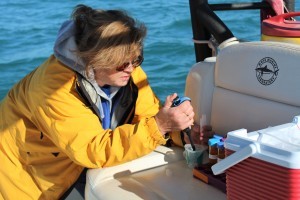
Red Tide Institute
The Red Tide Institute at Mote Marine Laboratory leads Florida red tide mitigation and control research.
1600 Ken Thompson Parkway
Sarasota, FL 34236
Ph: (941) 388-4441
Hours: 10AM - 5PM
A 501(c)3 nonprofit organization.
The marine biome is a major component of Earth's climate system, yet we still know little about how it will respond to future changes in ocean circulation, ocean acidification and rising global temperature. Organisms and ecosystems are dependent on the delivery of inorganic nutrients to fuel their metabolism, thus nutrient delivery processes control the distribution and productivity of marine life. Biological productivity in the surface ocean is an important control on the oceans’ ability to serve as a sink for atmospheric carbon dioxide via The Biological Pump, and thus, has tremendous impact on Earth’s climate.
Marine biogeochemistry is the study of the physical, biological, geological and chemical processes that distribute and transform nutrients and other chemical species in the marine environment. Observations of physical/biological/ecological coupling give insight into how these processes contribute to global biogeochemical cycles. The Marine Biogeochemistry Program uses observations from ships, satellites, and sensors on fixed and autonomous platforms to quantify the rates and magnitudes of these processes in coastal and open ocean environments.
In order to make new observations of the marine environment, our program works closely with the Ocean Technology Program to develop and apply innovative ocean technology capable of broadening the observational capabilities of the oceanographic community and further our understanding of the oceans’ role in global climate and how the marine environmental will respond in a changing world.
Photo credit: Melody Jue